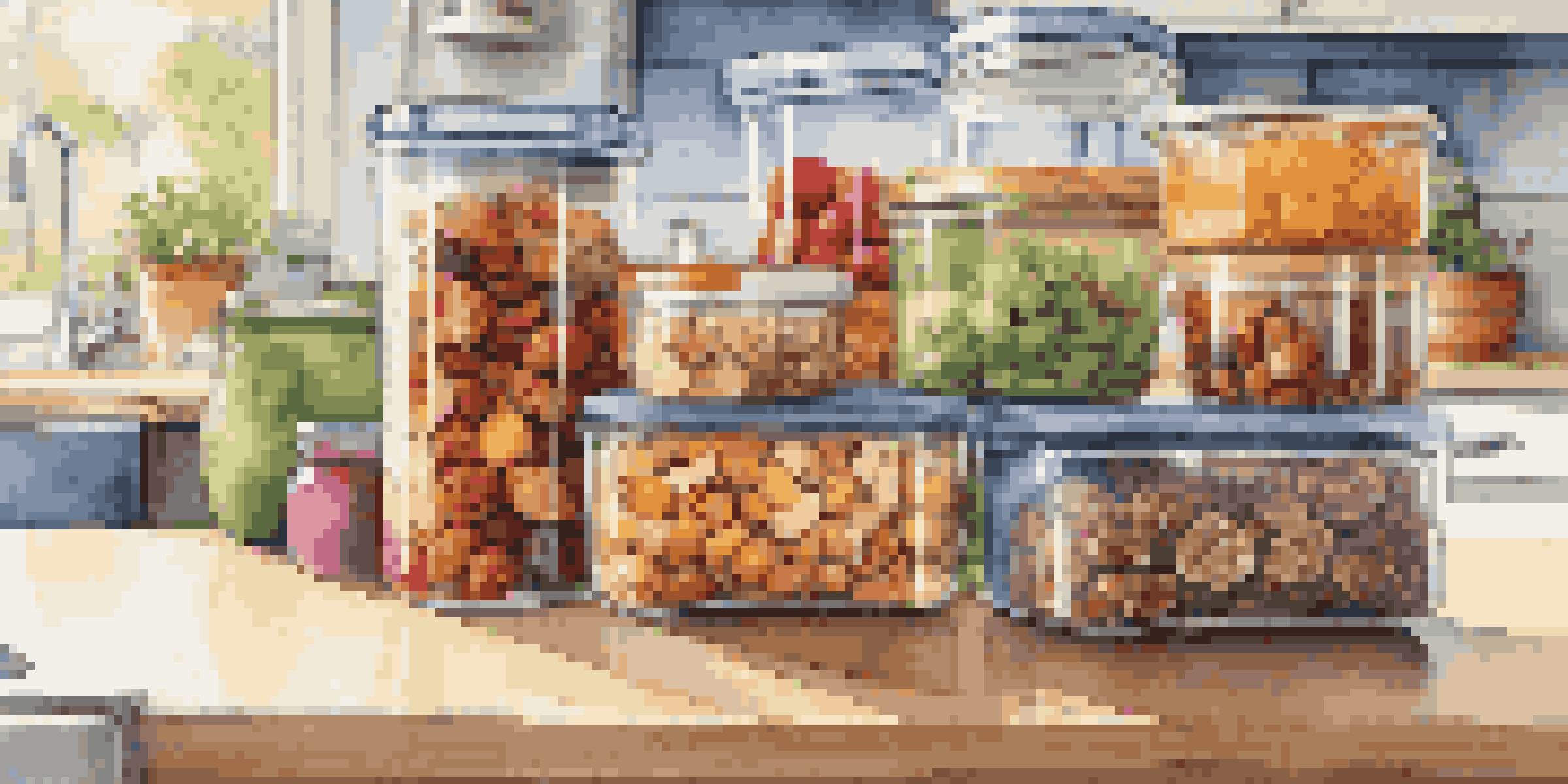How to Pack Snacks for Travel on a Specialized Diet

Understanding Your Specialized Diet Needs
Before you pack snacks for travel, it's important to understand the specifics of your specialized diet. Whether you’re gluten-free, vegan, or low-carb, knowing what works for you will help you avoid any unwanted surprises. Take a moment to list out the foods you can and cannot eat, and consider any potential allergens that might be present in commercial snacks.
By failing to prepare, you are preparing to fail.
This understanding will guide your choices at the grocery store and ensure that you’re prepared for your journey. For example, if you're on a ketogenic diet, you’ll want to prioritize high-fat, low-carb options. Having a clear list of your dietary needs will not only make packing easier but also give you peace of mind while traveling.
Remember, being prepared is key. By knowing your dietary restrictions, you can avoid feeling overwhelmed when it's time to snack. This preparation sets the stage for a smoother travel experience.
Choosing the Right Containers for Snacks
The containers you choose can make a big difference in how your snacks hold up during travel. Opt for lightweight, airtight containers that will keep your food fresh and protected. Clear containers are particularly helpful because they allow you to see what you have at a glance, reducing the chances of rummaging through your bag.

Consider investing in reusable snack bags or bento boxes, which are not only eco-friendly but also great for portion control. These containers can easily fit into your carry-on or backpack, making them convenient for on-the-go snacking. Plus, they often come in various sizes to accommodate different types of snacks.
Know Your Dietary Needs
Understanding your specialized diet helps you make informed snack choices while traveling.
By selecting the right containers, you ensure your snacks remain intact and enjoyable. This small step can elevate your travel experience, allowing you to focus on your journey rather than worrying about your diet.
Selecting Nutrient-Dense Snacks
When packing snacks, it's essential to choose options that are not only compliant with your diet but also nutrient-dense. Think of snacks that offer a good balance of protein, healthy fats, and fiber, as they will keep you fuller for longer. For instance, nuts, seeds, and dried fruits are excellent choices for a quick energy boost.
Healthy eating is not about strict nutrition rules, staying unrealistically thin, or depriving yourself of the foods you love. Rather, it’s about feeling great, having more energy, improving your health, and boosting your mood.
You can also prepare homemade snacks like energy bars or protein bites tailored to your dietary needs. This way, you can control the ingredients and ensure they meet your standards. Plus, making snacks at home can be a fun and creative process that allows you to experiment with different flavors.
By prioritizing nutrient-dense snacks, you’ll maintain your energy and satisfaction throughout your travels. This thoughtful selection can make a significant difference in how you feel during your trip.
Packing Snacks for Different Travel Types
The type of travel you’re doing can influence how you pack your snacks. For road trips, you can pack larger quantities and bulkier items, such as a cooler filled with fresh fruits and veggies. However, if you’re flying, you’ll want to consider TSA regulations and opt for snacks that are easy to carry and won’t spill.
For air travel, think about snacks that are compact and won't create a mess, like protein bars, jerky, or nut butter packets. These options are not only convenient but also provide the necessary nutrients without taking up too much space in your bag. Additionally, having snacks that are easy to eat on the go helps you stick to your diet while navigating busy airports.
Pack Smart Containers
Choosing the right lightweight and airtight containers ensures your snacks stay fresh and intact during your journey.
Adjusting your packing strategy based on your travel type allows you to be more efficient and prepared for any situation. This adaptability is key to ensuring a stress-free travel experience while staying true to your dietary needs.
Incorporating Local Foods into Your Snack Plan
While it’s crucial to pack your own snacks, don’t forget to explore local food options that align with your specialized diet. Research local markets or grocery stores at your destination to find fresh, regional produce that can complement your travel snacks. This not only helps you stick to your diet but also allows you to immerse yourself in the local cuisine.
For example, if you’re traveling to a place known for its fresh fruits, consider adding some to your snack rotation. Incorporating local foods can also make your travel experience more enjoyable and memorable, giving you a taste of the area’s culture.
Being open to local food options while adhering to your dietary restrictions creates a balanced approach to snacking on the road. This flexibility can enhance your travel experience, making it both enjoyable and nourishing.
Staying Hydrated While Traveling
Alongside snacks, it’s vital to stay hydrated during your travels. Dehydration can lead to fatigue and diminished focus, especially when you’re on a specialized diet. Remember to pack a reusable water bottle, which you can fill up once you’re through security at the airport or while on the road.
Moreover, consider snacks with high water content, such as cucumbers, watermelon, or even yogurt, which can contribute to your hydration levels. These snacks not only satisfy your hunger but also help maintain your hydration balance.
Stay Hydrated on the Go
Prioritizing hydration through water and hydrating snacks keeps your energy levels up while traveling.
By making hydration a priority, you’ll feel more energized and alert throughout your journey. This small but significant aspect of travel can greatly enhance your overall experience.
Planning Ahead for Unexpected Situations
Traveling can be unpredictable, which is why planning ahead for unexpected situations is essential. Always prepare for delays or changes in your itinerary by packing extra snacks. Having these on hand can help you avoid the stress of finding compliant food in a pinch.
Additionally, familiarize yourself with dining options at your destination, particularly those that cater to your diet. This knowledge can save you time and headaches when it comes to meal planning during your trip. Apps or websites that specialize in dietary-friendly restaurants can be invaluable resources.

By being proactive about potential challenges, you empower yourself to handle unforeseen circumstances with confidence. This preparedness can transform hurdles into manageable situations, allowing you to enjoy your travels fully.